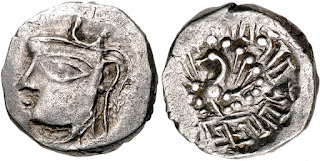Harshavardhan/ Image Source
A contemporary of Chalukya King Pulakeshin II who defeated him on the banks of Narmada in 618 AD, Harsha was an Indian emperor who brought a semblance of stability to the politics of North India amidst the chaos that characterized the period following the decline of the Gupta empire.
The reign of Harsha, also known as Harshavardhana, is well documented compared to other ancient Indian rulers. His court-poet was the famous Brahmin author Banabhatta whose magnum opus is Harshacharita (The Deeds of Harsha). Chinese scholar and traveler Huen Tsang came to his court leaving a valuable description of India.
Harsha who ascended the throne in 606 at the age of sixteen was the second son of Prabhakaravardhana, a local king of the Pushyabhuti dynasty (Vardhana dynasty) ruling from Sthanvisvara (modern Thanesar in Kurukshetra district of Haryana).
Prabhakaravardhana grew in strength by successfully raiding against the Hunas, who still held parts of the Panjab, After Prabhakaravardhana, Harsha’s elder brother, Rajyavardhan, took over the reins of the kingdom. However, after a brief period, he along with his brother-in law and Maukhari ruler Grahavarman of Kannauj, was killed in a battle with Sasanka, the fierce anti Buddhist king of Bengal.
It was against this backdrop that Harsha became the ruler of Thanesar and as Grahavarman died childless he was invited by the nobles of Kannauj to assume the Maukhari throne.
After coming to the throne Harsha began to strengthen his position and brought most of Northern India, from Bengal to Gujarat, under his control. His empire was feudal in structure.
After bringing North India under his subjugation it was natural for Harsha to focus his attention on the Deccan. However it was an unsuccessful endevour as he was thoroughly defeated by Pulakeshin II as mentioned earlier.
Harsha was a scholar-king. He had authored three dramas: Ratnavali, Priyadarsika and Nagananda (the Joy of the Serpents).
After ruling for 41 years Harshavardhan died in 647 AD.

Comments
Post a Comment